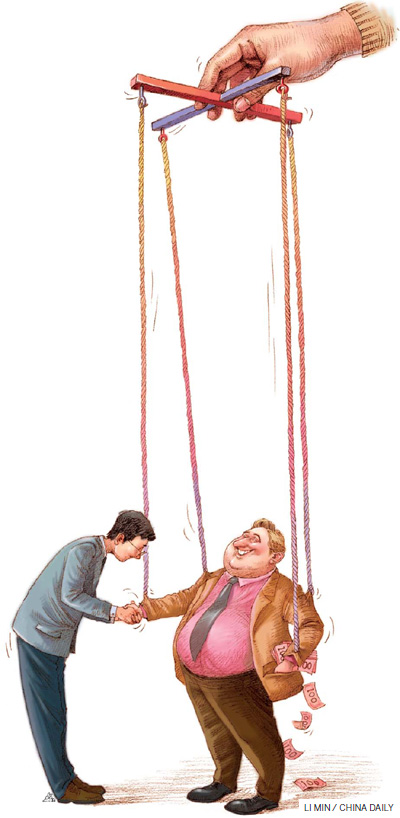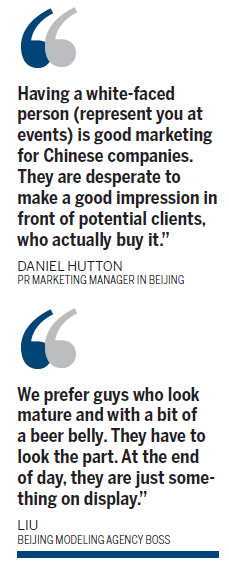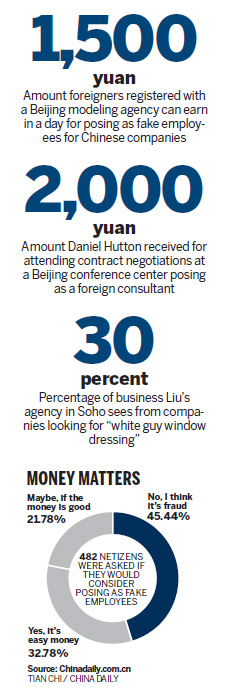Focus
Foreign faces there for rent
By Cui Jia (China Daily)
Updated: 2010-08-27 13:39
 |
Large Medium Small |
Firms find expats can help make the deal. Cui Jia reports in Beijing.

"You need to be a Caucasian male, look professional and mature but not too handsome, otherwise people might think you're an actor," said the male voice on the end of the line.
Daniel Hutton, an American marketing manager in Beijing, had called the number after being told by friends about an agency that pays foreigners to "rent their white faces" to Chinese companies.
In fact, it is one of many now exploiting a thriving trend known as bairen chong menmian, or "white guy window dressing".
These job agencies offer white- and dark-skinned clients from Europe, North America, Australia and Africa to Chinese business owners, who hire them to pose as employees or partners at important meetings with dignitaries or potential investors.
The only qualification they need is to be a laowai, the Mandarin word for foreigner.
Firms have been using the ethically-questionable technique for some time to boost credibility or present an image of being internationally connected, according to experts in the world of business, yet it has only hit the headlines in China in recent months.
After hearing about the trend, Hutton, who has worked for an international public relations company in the capital for 18 months, said he was intrigued and decided to find out who actually benefits from a practice that many people argue is little more than fraud.
Posing as a student of Chinese, he got an interview with a modeling agency in Beijing's central business district and invited a China Daily reporter to come along.
"Having a white-faced person (represent you at events) is good marketing for Chinese companies," said the 29-year-old. "They are desperate to make a good impression in front of potential clients, who actually buy it."
And China is not the only country where this is going on, said Hutton, whose company has branches across Asia. The use of foreign faces to gain an advantage over rivals is reportedly popular in South Korea, Japan, Thailand and Vietnam.
Model workers
Dressed in a black, tailor-made suit, Hutton arrived for his interview in a Soho office block to find four equally well-fitted laowai already waiting.
"Looks like we're really in demand, so fingers crossed," he joked as he sat down to take his place in the queue. Thirty minutes later, he walked out of the meeting room with a big smile on his face. He had been told he fit the bill for "window dressing" perfectly.
"(My interviewers) looked at my resume and were happy with my major at university, which is marketing, but they said I wouldn't be using any of it," said the American.
"I don't need to be a professional, I just need to look like one," he added. "I need to remember my lines, just like an actor."
In the meeting, Hutton learned that he would earn on average 300 yuan ($45) an hour or 1,500 yuan for a day, each time in cash. Contracts were only signed for individual events, he was told.
Of the five people interviewed that afternoon, only two of them were hired: Hutton and a man in his 40s. The others were rejected because they looked "too student-like", according to Liu, the agency's manager, who spoke to China Daily on the condition his full name and company would not be identified.
"We prefer guys who look mature and with a bit of a beer belly," he said. "They have to look the part. At the end of day, they are just something on display."

Liu explained that he opened the agency five years ago to provide foreign models for fashion shows and photo shoots. However, it was not long before he began receiving calls from clients wanting models to pose as employees to impress their business contacts.
"It's been going on for years and my clients are getting pickier and pickier," he said. "They don't want good-looking models with perfect bodies anymore because people doubt they really work for them."
Today, about 30 percent of the business Liu receives is from companies looking for "white guy window dressing".
"It obviously works for them, otherwise the number of clients I get wouldn't increase every year like it is doing," he said. "Most of them hear about me through word of mouth. I don't advertise this side of my business."
Most of the laowai models on the agency's books are English language teachers looking for extra cash or are unemployed, added Liu.
Job agencies catering to foreign tutors also offer "window dressing" services, albeit mostly on the quiet.
ChinaESL advertises teaching vacancies on websites and in Beijing listings magazines, such as The Beijinger. When a China Daily reporter approached them posing as an executive looking to hire expats by the hour for corporate meetings, a member of staff surnamed Tang responded by offering a price list.
"We charge 600 yuan for an hour and 3,000 yuan for the day," she said. "I can promise you they will look and act like professionals during your event (our laowai) are all experienced and know what they are doing.
"You can choose from different skin colors and accents if you want them to talk," she added.
Later that same day, the China Daily reporter called ChinaESL and asked the same question, only this time revealing their true identity. "We only provide foreigners for English language teaching positions, that's all," the customer service worker insisted before hanging up the phone.
Dressed to impress
Three days after Hutton's interview with Liu's agency in Soho, he was offered a job: He was to accompany the manager of a Beijing-based trading company as his foreign consultant to a day of contract negotiations with a firm from Central China's Henan province.
"I'm really excited about my small role in this game," he said as he practiced the "lines" he was provided by the client.
Along with the 1,000 yuan he received up front, he was also provided with a new identity - just Sam, no last name - and a set of company business cards printed in English and Chinese.
All Hutton was required to do during the meeting, which was at the Jiuhua Resort and Convention Center, near the city's Capital International Airport, was shake hands with the client's business associates, nod quietly when the boss said anything and smile.

"My boss's partners were obviously impressed to see me there, although I didn't understand what they were talking about," said the American. "Each of them even took picture with me, one by one."
With the contract quickly secured, Hutton joined staff from both companies - about 10 people - for a luxurious banquet before retiring to his free room at a four-star hotel. He received another 1,000 yuan from his client after seeing off the Henan delegates at the airport the next morning.
"It was mission accomplished," said Hutton as he later recalled the experience of earning one-fifth his monthly salary in just a day and with very little effort. "I was told I did a good job."
Although a profitable exercise, he insisted it was a one-off experiment that had left him uneasy about the ethics of such a practice.
"Such a marketing strategy is great but I still think it's fraud," he said. "The company will definitely lose all credibility if a partner or client finds out what they have done.
"It's not a case of laowai trying to fool Chinese, though. This is Chinese trying to fool Chinese," he added.
A survey of 482 netizens by chinadaily.com.cn found that more than 45 percent said they would never agree to be "window dressing" for a Chinese company because they feel it is fraudulent. About one-third said they would do it because it requires no skill, while the rest admitted they would consider it if the money was good.
Facing the facts
Sociologists suggest the Chinese concept of "face" - a positive public image - is largely to blame for the growing use of bairen chong menmian.
"Face, we say in China, is more important than life itself," Zhang Haihua, author of Think Like Chinese, recently said in an interview with CNN. "Because Western countries are so developed, (Chinese) people think they are better off. So they think that if a company can hire foreigners, it must have a lot of money and have very important connections overseas.
"That's why when (a company) really wants to impress someone, they roll out a foreigner," she said.
Business experts say the technique works at its best in less developed areas, where seeing or talking with laowai is still something to boast about.
"I don't like the word 'rent'. You can only rent goods, not people," said an employee named Fang with a Canada-based international energy corporation.
"We hired some foreigners on short-term contracts to represent our company and do jobs that are not worth sending our high-ranking managers to fly all the way from Canada for, such as giving speeches or cutting ribbons at ground-breaking ceremonies.
"They are not just any foreigners, they know our business," he insisted. "The reason we do that is to cut travel expanses and to let our managers do more important things."
Fang added he does not feel laowai are superior to Chinese and believes that the nation's "love affair with white faces" will disappear as it becomes more diverse and "internationalized".
"All those Chinese companies that hire random foreigners as a temporary facelift are fraudsters and so are the laowai who play the parts," he said.
Central authorities announced in May it intends to draft China's first immigration law following a surge in expats looking to take advantage of the booming economy in the world's most populous nation.
The law is likely to divide potential immigrants into categories, such as skilled or unskilled workers.
In the meantime, the trend of using "window dressing" looks far from dying out soon, said agency boss Liu.
"Where there is demand there is supply," he said. "Many foreigners come to China with no plan or real expertise, except being a native English speaker. Being the window dressing is perfect for them and for my clients."